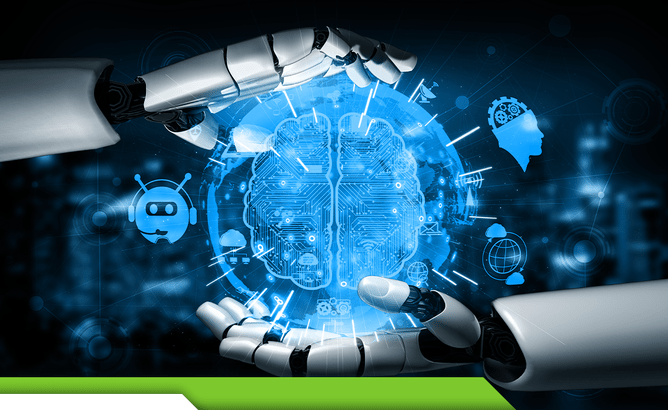Benefits, Downsides and Ethical Considerations of AI
In today’s rapidly evolving digital landscape, organisations are becoming increasingly aware of the need to embrace digital transformation initiatives to stay competitive. One of the key enablers of this transformation is the integration of Artificial Intelligence (AI) systems. AI already is and will continue to power the next phase of digital transformation initiatives and software, creating opportunities and improvements not previously possible by providing a range of solutions to optimise business processes and enhance customer experiences. In this blog post we will explore the advantages and challenges of leveraging AI systems to enhance digital transformation initiatives and outline the key considerations for an ethical use of AI policy.
Benefits of incorporating AI systems into digital transformation initiatives:
AI systems can be used to automate repetitive and time-consuming tasks, allowing employees to focus on higher-value activities. This boost in efficiency streamlines processes, improves productivity and accelerates digital transformation initiatives.
AI has the ability to process vast amounts of data quickly and accurately – identifying patterns, generating insights and making predictions that would be difficult for humans to do in a timely manner. This enables organisations to make informed decisions from their data, optimise their operations and improve customer engagement.
Organisations can utilise AI-powered chatbots and virtual assistants to enhance customer interactions by providing personalised recommendations, resolving queries promptly and delivering seamless interaction 24/7.
AI systems leverage predictive algorithms to forecast trends, anticipate customer behaviour and optimise resource allocation. Adopting this proactive approach to digital transformation initiatives enable organisations to gain a competitive advantage and make well-informed strategic decisions.
Downsides and Risks of AI systems:
AI systems can inadvertently perpetuate biases present in the training data, leading to unfair or discriminatory outcomes. It is crucial to address these biases to ensure fairness and inclusivity in the decision-making process.
AI systems are extremely data-driven and thus require large volumes of data to operate effectively – data that may contain sensitive information. Organisations need to mitigate these risks by establishing robust data protection mechanisms, complying with privacy regulations and guard against potential security breaches or unauthorised access.
The integration of AI systems has the potential to result in job displacement or require employees to upskill. Organisations considering implementing AI systems should have a proactive workforce adaption plan in place to ensure a smooth transition for employees.
Finally, the potential impact of regulation on AI is significant and can’t be ignored. On the one hand, regulation can provide clear guidelines and standards that ensure the responsible development and deployment of AI systems. On the other hand, regulation can stifle innovation and limit the potential benefits of AI. Industry and Science Minister Ed Husic has already flagged that “the government is prepared to regulate AI if businesses fail to develop and use the new technology in a way that is responsible and meets community standards”.
Ethical use of AI Policy:
To harness the benefits of AI systems while addressing the potential challenges, organisations need to ensure they establish a comprehensive ethical use of AI policy comprised of the following key components:
Transparency: AI systems should be understandable. Users should be made fully aware of the system’s purpose, how it works and what limitations may be expected.
Fairness and Bias Mitigation: Addressing bias and ensuring fairness in AI systems is critical. The policy should emphasise the need for unbiased data, unbiased algorithms, and regular audits throughout the development and deployment stage to identify and mitigate potential bias.
Privacy protection of security: Machine learning models on which AI systems are based rely on large volumes of data which may contain personal information that must be kept private. It is essential that the policy outline guidelines for data collection, storage, and usage and align with data protection laws and regulations.
Reliability and safety: AI systems should be subject to rigorous testing and deployment management processes prior to release to ensure they operate in accordance with their intended purpose.
Accountability: Designers and developers of AI-based solutions should work within a framework of governance and organisational principles that ensure the solution meets ethical and legal standards that are clearly defined. The policy should define clear lines of accountability and responsibility for the development, deployment and outcomes of AI systems.
Human Oversight: The policy should emphasise the need for human oversight to be employed during all phases of the development, implementation and maintenance of AI systems.
Social and environmental impact: Ethical use of AI policies should consider the broader social and environmental impacts of AI technologies and take steps to mitigate any negative consequences.
Are you ready to revolutionise your business and soar ahead of the competition?
Embracing the transformative potential of AI is the key to unlocking unprecedented growth and success in the digital age.
Unlock the Power of AI: Explore Our Cutting-Edge Solutions Today!




